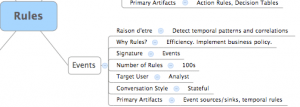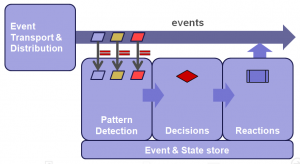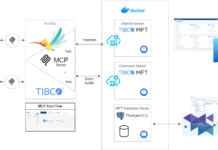 In a previous post we commented on IBM’s Conceptual Model for Event Processing Systems, but failed to observe that IBM’s rule engine group, Ilog, was noticably absent from its contributor list. So perhaps it was both fortuitous and timely that Ilog’s Daniel Selman recently added another “viewpoint” on the position of event processing (aka the rules viewpoint).
In a previous post we commented on IBM’s Conceptual Model for Event Processing Systems, but failed to observe that IBM’s rule engine group, Ilog, was noticably absent from its contributor list. So perhaps it was both fortuitous and timely that Ilog’s Daniel Selman recently added another “viewpoint” on the position of event processing (aka the rules viewpoint).
Daniel’s take on the “primary users (sic) of rules technology” are the (use cases for) automating decisions, event responses, processes and inferences. I think these might be better classified by renaming then as decision processing, event processing, and business process processing. But inferencing, which Daniel notes as being a technology to support Artificial Intelligence, is not so much a (user or) use case, but a means of providing knowledge-based reasoning to support any of decisions, processes, etc – “AI” is not (or should not be) a means unto itself.

Indeed, one could probably argue that:
- all business processes are driven by events of some kind, and involve decisions and (re)actions;
- all processes, decisions and event processing are context (i.e. state) driven; however, some processes and algorithms are used in a subordinate fashion to a stateful process (consider a typical decision service that is subordinate to its application server and database layers);
- inferencing can be used to enhance any part of the event-handling process as a form of declarative rule control.
In TIBCO’s experience, an event driven rule engine (like TIBCO BusinessEvents) can be used to provide dynamic business processes, event-driven decisions, and real-time control mechanisms – and often all 3 – exploiting and building on the fundamentals of complex event processing.
So, on the utility of rule engines, we totally agree with Daniel!





